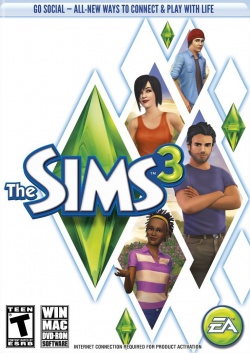PC World Interview with Ben Bell
Countdown to The Sims 3: A Chat with Executive Producer Ben Bell
By Matt Peckham
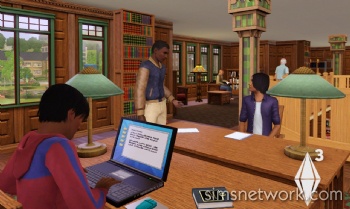
To crib from Sinead O'Connor, nothing compares to The Sims. It's the bestselling PC gaming series ever. It's also kind of a paradox. You don't shoot guns. You're not fending off an alien invasion. The hellmouth hasn't cracked open, leading to Mars or Silent Hill or wherever. And after two installments and oodles of expansions, it's about to lure us back for thirds: The Sims 3 ships for Windows and OS X systems next Tuesday, June 2nd.
The Sims 3 executive producer Ben Bell phoned me earlier to chat about the franchise, his favorite features in the new game, and how it's pioneered online self-expression and creative content exchange.
Game On: The Sims, as most know, is a massive franchise, the most popular PC game series ever, with over 100 million units sold since February 2000. Why do you think it's done so well?
Ben Bell: The Sims is a game that lets you create people. You can customize what they look like, and control their lives and decide what they do. The reason I think that's so interesting for people is because the game immediately reflects who you are as a person when you're playing it.
The game has very open-ended goals. As a controller of people, as a controller of life, you get to decide what you're trying to do with the game. You can help your characters get ahead in life, you can play dirty tricks on them, you can recreate situations from your own life with the game. So immediately as you start to play with it, it becomes a reflection of you, and I think that's really appealing to people. It inspires creativity as you're playing, so it's a piece of entertainment, but it also becomes like a diary.
GO: Let's walk through a few of The Sims 3's new elements. What's Ben Bell's favorite feature?
BB: My favorite new feature is definitely the trait system, for two reasons. Number one, I feel that the promise of being able to recreate people is exciting, but we sort of complete the promise by giving you the ability to create real people with real personalities. In The Sims 3, you can create a person and give them different personality traits. You select from a very long list of traits, there are in fact over 60 of them, and you describe who you want your characters in the game to be and then they behave accordingly.
For instance, if you want your character to be artistic, they'll decide that they want to paint and they'll be really good at it, or they'll be interested in writing books, and so on. Whereas if you decide you want your character to be evil, they'll be really happy when bad things happen to the people around them.
So I really like the idea of traits, but secondly, I'm particularly happy with the way we executed the idea. Every trait has several dimensions to it, so the traits determine not only what the Sims want from life, but how they relate to other people, how they use things in the world, what they're capable of in life, and so on. It's really rich, it's really deep, and it's very believable.
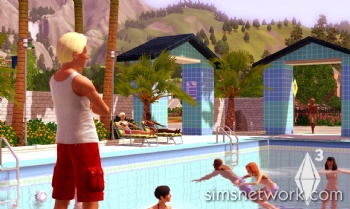
GO: Can you comment on where you landed between the tactical and strategic Sims management layers?
BB: One of our guiding principles when we were designing the game was that we wanted the game to feel like exactly whatever you were interested in, that is was about your story, the things you were trying to do with your characters. To fulfill that promise, we made it so that the Sims are more intelligent now than they've been in the past. So they're more capable of taking care of themselves.
Let's say you just wanted to be an observer of the game, that you wanted to see how the personality traits manifest. You could take your hands off the controls and just watch, and the Sims will take care of themselves. They'll act according to their personality traits and develop relationships and so on. But the moment you pick up and play one of the Sims, if you sort of think of the Sims as toys, the moment you start to play with one of them, you'll get to look at what they want.
They all have individual wishes, so you can see what some person is thinking about and what they want based on the things that are happening around them, who they are, and where they're at in life. You can really start to dive deep on those wishes, and help them fulfill every single one. It should feel like you get to shine the light wherever you want, and you don't have to stop looking at something if you're not interested in anything else.
GO: You've made customization a central tenet this time, letting users toggle just about anything, from aging to death.
BB: It's such a big game, and people have so many different ideas about what they want to do, so we felt like it was really important to enable everybody to do what they wanted. It's a simulation of life, so some people are interested in seeing what it's like to evolve many generations of a family, whereas some people just want to focus on a single character and develop that character's story extensively. We wanted to give people all of the widgets and dials that we could, for them to create their scenarios.
You don't have to mess with any of that stuff. If you just want to play the game as we designed it, it's there for you to jump right in, and there are certainly lots of short term goals that you can achieve. But if you really feel like you want to retell the history of your family, or of some character that you're working on in your novel, or all of the people that you work with in real life, you can set up the game to do that.
GO: Including ghosts.
BB: There were ghosts in the past, but we thought it'd be fun to make them playable characters this time around, so that if somebody passes away in the game, which happens, unfortunately, you can take them over as a playable character and they'll be this fun, interesting thing to play with.
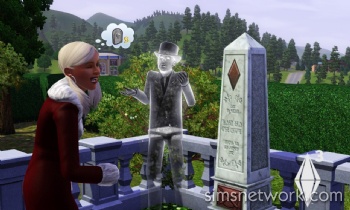
GO: The Sims 3 is actually a prequel of sorts, right? Is it also an alternate timeline? Will Romulans and Vulcans come shooting out of a black hole at startup?
BB: We took some of the characters who appeared in past games and we created earlier versions of them. That was more of a nod to our fans who've followed the series. But The Sims isn't really about those characters. They're background for your character, and while you can play as these unique characters we've created and dropped into the town, you can also choose to replace any of them with people that you know, your favorite TV character, your favorite sports heroes, whatever it is.
We definitely wanted to use personality traits to say something funny about the classic characters that everybody knows from The Sims and The Sims 2, but I wouldn't read it as a prequel. The story is there for you to carry on.
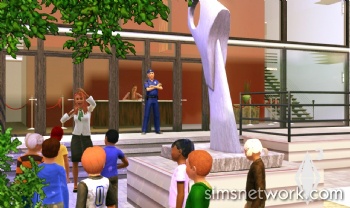
GO: The Sims 3 is the first main Sims game not to include series creator Will Wright on the design team. Did that complicate the transition process?
BB: Since I've been working at EA, Will was focused on Spore, so there really wasn't a transition period, though I will say that because we still have a lot of the people who worked on The Sims and The Sims 2, we've retained a strong sense of the values that made The Sims such an interesting game. Celebration of player creativity, open-ended goals, you know, very limited punishment for failure. In fact failure is funny in The Sims 3. A lot of the same sensibilities were carried forward by virtue of the fact that the same creators who worked on The Sims and The Sims 2 were the designers and lead engineers on this project.
GO: You say that "failure is funny," which makes me think of Fable 2, where failure was off the table, and Lionhead used dramatic cues instead of making you go stand in the penalty box. Can you talk about how that works in The Sims 3?
BB: I think it's even more extreme than Fable 2. In The Sims 3, in fact in all The Sims games, I'd say because your identity, you as a player are outside of the game, you're not controlling the character, that when something bad happens to the characters, first of all you're an observer. It's kind of like it didn't really happen to you, it happened to them, and you probably made it happen to them. The game isn't particularly punishing.
Say something bad happens to the characters, like their house gets set on fire. They foolishly freak out, stand around, point at it, scream, shout, and just kind of make a big scene out of it. So in a way it kind of becomes funny that they were cooking at they set their kitchen on fire. And if you want to, you can create a Sim who's clumsy and more likely to cause accidents and experience them, so you get to see some of those humorous moments.
So it's funny because of the way characters move, the way they react to bad things that happen. When they're new to working out and they're running on the treadmill and they trip and fall, they're very funny, goofy characters to watch. Nothing terrible is going to happen to them, but more importantly, you probably have a bunch of other Sims in the household, so it's not like if you want to lock one of your Sims in a room and wait until they pass away, it's not like the game's over. You can keep playing. The town is alive. You could switch to another family, see what it's like to play from a different perspective in the same town. And in fact you actually maybe just made your game a little more interesting.
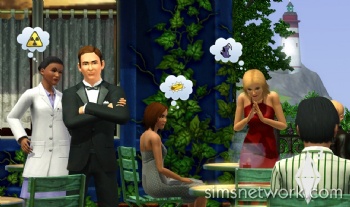
GO: A lot's changed about the market since The Sims 2 came out back in June 2005. Nintendo's Wii, the success of the DS, the rise of online sales and downloadable content, micro-transactions, and the PCGA thinks PC gaming's bigger than ever. Any of that inform your design choices this time around?
BB: I think that The Sims on PC is really well set up for the landscape that is the background for our business. Because the game is about creativity it really encourages people to share things that they've made with the game. And in the past, we've made it really easy to share things like, take your household and the family that lives in it and upload it to an online exchange so other players can download it.
We've already created this design that encourages you to share. We've created a setting in the form of The Sims Exchange where you can share things. In a way we're already there, we're pioneering all these changes in the business, where players are connecting to other players and expanding their experience through those connections.
With The Sims 3, we just wanted to make it easier and more natural, and to open it up to more people who play the game. With that in mind, there were a couple of things we did.
First of all, from TheSims2.com you can get to something called The Sims Exchange. TheSims2.com gets over five million unique visits a month, and most of the people coming to TheSims2.com are there to share content from their game, or to download content from other people. The Sims 2 was made so that it would be easy to modify things within the game, to create custom looks for chairs and characters and so on. We felt that was really cool, that it drove continued interest in the game and its enjoyment well past the purchase point. We wanted to make it so that every player could contribute interesting things, interesting unique content to that exchange, so we created a feature called Create a Style, where you can basically change the look of just about anything in the game.
You've got clothing on the characters if you decide that you don't like the pattern or the material on it, or the colors that are influencing the pattern, you can change that. If you want the patterns on their clothing to match their car, you can apply it to their car and their furniture and their toaster. Anything in their life can be customized in this really fundamental way. So you have a game where the average player, who may not have much artistic background, is customizing the world to look like their favorite football team, or creating some holiday theme. And you can just press a button and upload it to TheSims3.com and then other players can bring those things into their world, so it becomes really easy for players to become content creators with The Sims 3.
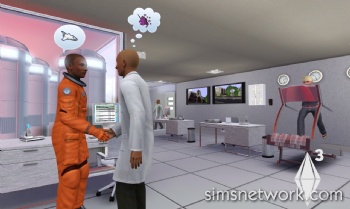
GO: The Sims Online shut down last August without transitioning to a new version. Do you think The Sims series works better offline, or like Will Wright said of Spore, that it's a "massively single-player" game?
BB: I think The Sims is massively shareable, where your game is your diary, or it's your painting. It's your private thing you're working on. Maybe you're doing something that you don't want anyone to know about, but then one day you create something. You create a cool family that looks like it'd be interesting for your friends, and you upload it online. All of a sudden you're able to contribute to that giant body of online content. Hopefully it should be as seamless and thoughtless as possible. It should feel really natural just to pass that stuff along.
But I do think that with The Sims, because you're creating something that is really a reflection of who you are, people don't necessarily want to share that experience. They might want to wait and share a piece of it, share it at the right moment when they've created something that they feel really good about.
GO: The privacy question really resonates, especially given what Raph Koster said a couple years ago about single-player games being doomed. He meant it much more subtle, of course, but the implication was that all these introverts were about to get dragged kicking and screaming online.
BB: It's a different cadence, and you know, there's so many gray areas when you're talking about online experiences. You talk about Facebook and it's the same way. You know, you don't change it until you want to. It's there for you to work with and play, and when you're ready to upload and share you can do that.
I just feel like there's this huge continuum of experiences now that can be classified as entertainment that range from chatting online to playing Fable 2, and what's kind of happening now is that the capabilities of one experience are getting spread across to the other and it's creating all kinds of new opportunities for people to connect and enjoy their games and share their games and expand their games. But it gets really confusing to talk about, because things are changing and it's not, one thing is not exactly like another in this new landscape.
GO: Thanks Ben.
Stay tuned for my review of The Sims 3 next Monday, check out our sneak peek at the game back in March, and if you like, you can monitor EA's The Sims 3 Twitter, Facebook, MySpace, and YouTube feeds, or bookmark EA's E3 Press Conference and watch it live on June 1 at 2pm PT for, per EA, "a [The Sims 3] trailer at the start of the press conference that no one's ever seen."














